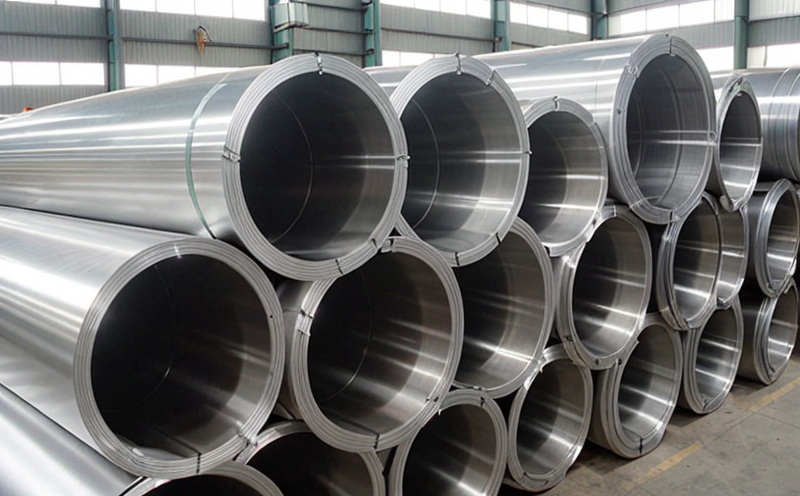IEC 60068-2-78 Damp Heat Steady-State Testing
The IEC 60068-2-78 standard for Damp Heat Steady-State Testing is a critical procedure used to evaluate the resistance of materials, especially metals and their alloys, to environmental exposure. This test simulates real-world conditions where products may be subjected to prolonged exposure to high humidity combined with elevated temperatures. The testing ensures that marine equipment made from aluminum remains functional and durable under such challenging environments.
The process involves placing specimens in a controlled environment chamber that maintains specific temperature and relative humidity levels for an extended period, typically 96 hours. The temperature is usually set between 50°C to 80°C while maintaining a high relative humidity of around 93% RH or higher. This exposure duration and conditions are designed to replicate the harsh marine environments where aluminum materials are commonly used.
Aluminum, being widely used in shipbuilding due to its lightweight properties, is particularly susceptible to corrosion when exposed to water and moisture. Thus, testing this material according to IEC 60068-2-78 ensures that products meet stringent quality standards necessary for maritime applications. The test helps identify any potential weaknesses or vulnerabilities in the design of these materials before they are deployed into service.
Preparation of specimens is crucial; they must be representative of the actual product and undergo appropriate treatment if needed, such as anodizing, painting, or coating. Once prepared, they are placed inside a chamber maintaining the specified temperature and humidity levels for 96 hours. After this period, the specimens are carefully examined to assess their integrity and any signs of degradation.
The results from these tests provide valuable insights into how well materials like aluminum perform under damp heat conditions. This information is invaluable not only for material selection but also in optimizing production processes and improving product longevity. Compliance with such standards adds significant value by ensuring reliability, safety, and performance across various maritime operations.
Understanding the significance of this testing procedure helps stakeholders appreciate its role in maintaining high-quality products essential for marine applications. It underscores the importance of adhering to international norms like IEC 60068-2-78 when developing robust materials for use in ships and other aquatic structures.
Applied Standards
The testing procedure strictly follows the guidelines outlined in IEC 60068-2-78. This international standard specifies the requirements for steady-state damp heat tests, which are particularly relevant when evaluating materials used in marine and ship equipment. Compliance with these standards ensures that the testing results are consistent and comparable across different laboratories worldwide.
Additionally, other related standards such as ISO 12944 (which deals with corrosion protection) provide supplementary information on how to interpret test outcomes in relation to real-world scenarios. These additional references help ensure that the testing not only meets current regulatory requirements but also aligns with broader industry best practices.
The combination of these standards ensures comprehensive evaluation, providing stakeholders with confidence in the reliability and durability of materials used in marine environments.
Benefits
- Enhanced Reliability: By simulating actual operational conditions, this test enhances the reliability of aluminum-based marine equipment. This ensures that products perform consistently under expected environmental stresses without compromising safety or performance.
- Informed Decision-Making: Results from these tests inform critical decisions regarding material selection and process optimization. They help manufacturers make informed choices about which materials are best suited for specific applications, leading to better overall product design.
- Quality Assurance: The consistent application of IEC 60068-2-78 standards across all testing processes ensures that quality is maintained at a high level. This builds trust among clients and stakeholders who rely on the accuracy and consistency of test results.
The above benefits highlight why adhering to these stringent testing procedures is essential for manufacturers operating within the marine sector. It underscores the importance of rigorous quality control measures in ensuring product integrity and customer satisfaction.
Competitive Advantage and Market Impact
- Compliance with International Standards: Adhering to IEC 60068-2-78 not only meets regulatory requirements but also positions a company favorably in the global market. Compliance signals commitment to quality, which is highly valued by international buyers.
- Increased Customer Confidence: When suppliers demonstrate their ability to meet such stringent standards, it fosters greater trust and loyalty among customers. This leads to long-term relationships based on reliability and performance.
The competitive advantage extends beyond mere compliance; it encompasses the broader strategy of differentiating oneself through superior quality assurance practices. Companies that prioritize these tests are better equipped to meet evolving market demands, thereby gaining a strategic edge over competitors who may not invest in similar measures.
This approach also contributes positively to the company's reputation within the industry, making it easier to attract new clients and retain existing ones. Ultimately, this translates into increased market share and sustained growth in the competitive landscape of marine equipment manufacturing.





